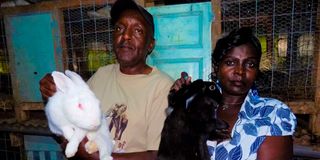Rabbits keep Nairobi couple going

David Kinyanjui Muhia with his wife, Rose Kinyanjui, hold rabbits that they keep in their Daroclael Rabbit Farm in Dagoretti, Nairobi.
Rose Kinyanjui and her husband David Muhia Kinyanjui have been rearing rabbits for almost two years.
The couple sells live rabbits, rabbit meat and make mats from the animals’ skin. They also sell rabbit manure and urine.
The two own Daroclael Rabbit Farm in Dagoretti, Nairobi County. Ms Kinyanjui says they started with a Sh600,000 capital.
“It has become a family business. We started with 30 rabbits in January last year – twenty does and 10 bucks. We bought them in Ngong at Sh750,” she says.
Unfortunately, most of the animals died within weeks of arrival.
“We overfed them on pellets, leading to bloat. We thought giving the rabbits large quantities of food would make them grow fast,” she says.
They bought more rabbits. The new breeds included New Zealand, California White, Dutch, Checkered, Chinchilla, Havana and Flemish Giant.
Just recently, the couple lost about 100 rabbits after giving the animals the wrong hay. There was a shortage of hay and a friend recommended that they use rice and millet leaves.
They sell rabbits that are three to four months old.
“Some like the Flemish giant are big but take longer to mature. The New Zealand and California Whites grow very fast,” Ms Kinyanjui says.
Weight and Price
Weight determines the price. A rabbit that is a kilo goes for Sh700. Most are 1.2-1.5kg when sold.

David Muhia Kinyanjui and his wife, Rose, with some of the rabbits they keep at their Daroclael Farm in Dagoretti in Nairobi County.
The couple avoids waiting until a rabbit attains two kilos because such an animal consumes a lot of food. The one that attains the weight goes for Sh1,800.
The Kinyanjuis get rabbit meat orders mainly from Chinese and other foreigners living in Hurlingham, Nairobi.
“They buy in bulk but their prices are discouraging. They insist on having a kilo at Sh450 but make more money when they sell the meat,” Mr Kinyanjui says.
“We slaughter the animals and weigh the carcasses. The Hurlingham clients want it that way.”
The couple sells about 20 rabbits every two weeks.
The animals are slaughtered and their meat packed. They also get orders from vets, mainly for the weaners, selling one at Sh750.
Like almost all other livestock keepers, the Kinyanjuis cite the high cost of feeds as their greatest challenge.
“There was a time the price of a stack of hay shot to Sh500. It has dropped to Sh350. Getting the hay and pellets is a big problem,” she says.
A 50kg bag of pellets used to go for Sh2,400 but is now Sh2,350. “We get about 20 litres of rabbit urine daily and sell to farmers nearby,” Mr Kinyanjui says. The urine is collected using gutters fixed next to the hutches. The couple has about 350 rabbits.
Useful Urine
“We could get as much as 40 litres of urine a day when we had more rabbits,” Mr Kinyanjui tells Seeds of Gold.
The urine is sold to farmers interested in organic fertiliser.
“A litre goes for Sh100. We also sell manure at Sh3,000 a pick-up truck, which is about two tonnes. It is diluted with water, at a ratio of 1:2,” he says.
The kits remain with their mothers for a month before being moved to their own hutches. The does are mated almost immediately.
Does give birth to four to 11 kits. If one of the rabbits gives birth to many young and another with few, the Kinyanjuis take some from the mother with many to the one with few to nurse.
The hutches are in a building measuring 30 by 15ft. Hygiene is important so they are cleaned frequently.
Mr Kinyanjui says rabbits could be the ideal venture in future as the country’s population increases and farmland gets smaller.
“Unlike cows, goats, camels sheep and other livestock, rabbits require a very small space,” he says.
Mr Kinyanjui advises the government to standardise the prices of rabbit products “so that there is a stable market”.
Ms Kinyanjui also makes mats from rabbit skin. One goes for Sh300 to Sh600.
“Those interested in the venture should start with a small number of rabbits. They will learn more as the business grows. But it requires patience and determination. Learn the symptoms of diseases and keep proper records,” she advises.
Every animal is given a name for easy identification. The records also show the date of birth.
“I wish the government could do more for rabbit keepers. Farmers need the training to refine their skills. County governments should build rabbit slaughterhouses too. Many people are craving rabbit meat but don’t know where to get it. Rabbit keepers cannot sell the meat to supermarkets,” she says.
The rabbits at Daroclael farm have not had serious diseases, except bloating.
“We have had training on dealing with bloating,” Ms Kinyanjui says.





